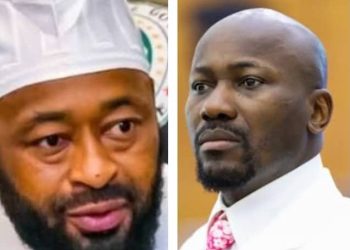On Friday, September 26, 2025, history unfolded in the ancient city of Ibadan. Long before sunrise, I found myself at the iconic Mapo Hall, arriving as early as 6 a.m. The city was alive with anticipation, for this was not just another day — it was the day Ibadan crowned her new monarch, His Imperial Majesty, Oba Rasidi Adewolu Ladoja, the Olubadan of Ibadanland.
We had been told the event would commence by 8 a.m., but as a proud member of the Ibadan Royalty Committee, patience is a virtue we have learned to embrace. After all, we have played a role in the installation of three Kabiyesi in recent years — the late Oba Mahood Olalekan Balogun, the late Oba Owolabi Olakulehin, and now the people’s king, Oba Rasidi Ladoja.
Seated under the leadership of respected elders like Professor Afolabi, Chief Mrs. Bola Doherty, Professor Soji Adejumo, Senator Kola Balogun, Oloye Aboderin, Colonel Akerele (rtd.), Chief Ganiyu Kola Balogun, and many eminent Ibadan sons and daughters, the atmosphere was charged with pride. Ibadan, once again, presented her rich cultural heritage to the world. Dignitaries thronged the historic Mapo Hill — the President of Nigeria himself, sitting state governors, former governors, royal fathers, and countless political juggernauts. For many politicians, this was the perfect arena to flaunt their grassroots strength before the President; some fought for recognition, while others showcased their long-established dominance.
Despite murmurs about the late start — with our Kabiyesi seated for nearly three hours under the scorching sun before the President’s arrival — all tension evaporated once the presidential entourage entered Mapo. The drums thundered, the crowd roared, and Ibadan became electrified. Even after eight hours in the blazing heat, we broke into spontaneous dancing. It was a day that crowned not just a king, but a rebirth of identity for Ibadan.
To understand the significance of this coronation, one must know the man now sitting on the revered throne. Oba Rasidi Adewolu Ladoja is no stranger to power, leadership, or sacrifice. A distinguished politician and statesman, he once served as the Governor of Oyo State from 2003 to 2007, leaving an indelible mark on governance and development. Born in 1944, Ladoja rose from humble beginnings in Ibadan to become a force in both the business and political world. He is known for his courage, resilience, and deep connection with the common people. Despite political storms — including impeachment battles and betrayals — he always emerged stronger, earning the admiration of indigenes as a man who never abandons his roots. Ascending the throne as the Olubadan of Ibadanland, Oba Ladoja is seen not only as a monarch but as a bridge between tradition and modern governance. His reign symbolizes restoration, unity, and a bold new vision for Ibadan.
Ibadan itself is no ordinary city. Founded in 1829 as a war camp, it quickly rose to prominence as the military headquarters of the Yoruba nation after the fall of Oyo. By the mid-19th century, Ibadan had become the largest city in West Africa, known for its fearless warriors, sprawling compounds, and unique system of chieftaincy. To be crowned Olubadan is not merely to wear a beaded crown; it is to inherit the weight of centuries of valor, sacrifice, and tradition. When the drums echoed through Mapo Hall, it was as though the spirits of the legendary Ibadan warlords — Ogunmola, Aare Latoosa, Balogun Ibikunle — all rose to witness the enthronement of a new custodian of their legacy.
Our Kabiyesi used the occasion to deliver a powerful message to the President: the creation of Ibadan State. For centuries, Ibadan has carried the weight of Yoruba history, politics, and culture, yet she remains underrepresented. Oba Ladoja’s call struck deep into the hearts of his people — a project dearer than any song or performance. Though the Senate President, His Excellency Godswill Akpabio, could not attend due to the remembrance of the late first lady of Akwa Ibom state , he has promised to visit the new monarch soon. The Chairman of Dangote Refinery was also conspicuously absent, but he too pledged to pay homage to Ibadan’s king in the coming days.
As the ceremony reached its climax, a storm brewed outside the hall. Social media was soon ablaze with a viral video of Fuji superstar, Alhaji Taiye Adebisi “Currency.” His song, Were la fi nwo were, was misunderstood by many as a message directed at the crowd. In truth, his intervention saved the day. Trouble began when the controversial Oluwo of Iwo, Oba Abdulrasheed Akanbi, appeared at the venue. Declared persona non grata in Ibadan for disrespecting the sacred Oloolu Masquerade, his presence incensed a band of fiery Ibadan youths. They surged against security operatives, threatening chaos. It took the swift mediation of elders — and the commanding voice of Taiye Currency — to pacify the boys. The song was not an insult; it was the only language they understood. Instantly, fists turned to dancing, and fury melted into rhythm. That was the genius of music in moments of tension.
Let no one be deceived: the real highlight of the day was not the misunderstanding over Taiye Currency’s lyrics, but the historic appeal for Ibadan State. This is our collective project — one that requires political will, financial commitment, and unity of purpose. With Oba Rasidi Adewolu Ladoja on the throne, Ibadan has rediscovered her lost glory. Never again shall we return to the dark days of political dundrums. This is a new era, a new dawn, and a future where Ibadan takes her rightful place as the heart of Yoruba civilization.
And as the sun slowly set behind the brown roofs of Ibadan, it was as though the ancient city exhaled with pride. From Oke Are to Beere, from Dugbe to Oje, the drums carried a single message: Ibadan has risen again. The crown has found its rightful head, the people have found their voice, and the ancestors have smiled upon us.
At the close of the ceremony, one elder rose, lifted his staff to the heavens, and declared with thunder in his voice: “Ibadan ti dide, a o ni subu mo!” — Ibadan has risen, and shall never fall again.
Long live the Olubadan! Long live Ibadan! Long live the Yoruba nation!
By Mogaji Wole Arisekola, who writes from Ibadan.

Folami David is a dynamic journalist who views the world through an analytical lens, translating complex narratives across multiple industries into compelling stories. With an insatiable appetite for information and a keen eye for emerging trends, Folami specializes in uncovering the interconnections between technology, business, culture, and society.


















